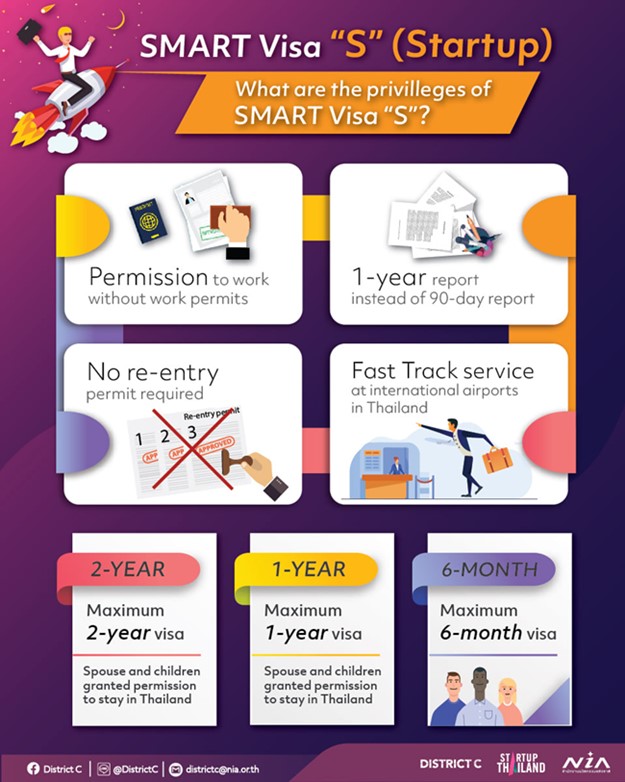
Thailand recently created a new category of visas for foreigners wanting to live and work in the country. The category is called a SMART visa with various types of visa available under it.
These depend on who you are and why you are applying.
One of the most popular visas falling under the SMART visa category is the SMART-S visa. This is a work visa targeting technology-based startup entrepreneurs in one of a number of targeted industries.
The visa is valid for two years and is available for foreigners who have already been able to establish a certified startup in the country.
If you are also interested in applying for atwo-year SMART-S visa, the following are the requirements you will need to fulfill in order to be eligible.

Requirements for a Thailand SMART-S visa for entrepreneurs
The requirements for a SMART-S visa in Thailand are quite stringent. For many entrepreneurs that will mean, while they may be able to fulfill one or two of them, others may be currently out of their reach.
You must have already established a startup company in Thailand, and it must be a company that is in one of the targeted industries the Thai government feels are vital for Thailand’s strong economic future. The targeted industries that are currently important to the government are these:
Next-Generation Automotive
Smart Electronics
Affluent, Medical and Wellness Tourism
Agriculture and Biotechnology
Food for the Future
Automation and Robotics
Aviation and Logistics
Biofuels and Biochemicals
Digital
Medical Hub
Human Resource Development in Science and Technology
Environmental Management and Renewable Energy
You must hold no less than 25% of the company’s registered capital. If not, you must be a director of the company.
You must have a deposit of at least 600,000 baht (approximately $20,000) in either a Thai bank account or in a bank in the country of your residence or nationality. It must have been in the bank for at least three months when you apply for the SMART-S visa.
If a spouse and/or children will be living with you in Thailand, there must be an additional 180,000 baht (approximately $6,000) per person in your Thai bank account or in your home/residence country’s bank account for the same three month period.
(In other words, if your wife/husband and two children would be living in Thailand with you, you would need to have at least 1,140,000 baht ($38,000) in your bank account before an application for a SMART-S visa could be filed.
You must have mandatory health insurance covering your entire period of stay in Thailand (an initial 2-years with a SMART-S visa), as well as insurance for your spouse and children.
The insurance must cover a minimum of 500,000 baht for hospital stays.
Be aware, as mandatory insurance for COVID-19 is now required for any foreign visitor to Thailand, this could be upwards of 43,000 baht ($1.370) per person per three month period/per year (details of Thailand’s mandatory COVID-19 insurance are still confusing, meaning the actual amount could be quite a bit more as it has not yet been announced if the 43,000 baht is per three-month period or per year).
There are also specific documents you will need to complete and submit in order to be considered for a SMART-S visa for Thailand. There is a handy checklist of all of them here.

What are the benefits/privileges of having a SMART-S visa for Thailand?
Of course, like any visa targeting business people and investors, there must be benefits or privileges they are entitled to if they qualify or few would be interested in applying.
For the SMART-S visa for Thailand, these currently include:
A visa that has a maximum renewable term of 2-years. (After two years, the visa will be renewable for a second 2-year period. Once your company is no longer classified as a startup and is now a fully-fledged business, you will likely then be eligible for the usual business visas issued to those owning or running companies in Thailand).
You will not be required to have a work permit as long as you are only working in the business that has been certified under the SMART-S visa. You will also not be required to have a re-entry permit should you leave Thailand on a trip.
The 90-day reporting most foreigners living in Thailand have to file will be extended to once a year for those on a SMART-S visa.
Your spouse and children will be able to live in Thailand for the length of the SMART-S visa. Your spouse will be able to work and your children can be registered at a Thai school.
Fast-track service at international airports all over Thailand will be offered if it is available.
While the SMART-S visa for Thailand may not be for every entrepreneur, for those who are able to fulfill all the requirements, it could be an excellent way of testing the water when it comes to doing business in Thailand.
It is also a reasonable way of being able to legally live and work in the Kingdom without having to deal with the Immigration hassles many other foreigners currently contend with every year.

How to apply for a SMART-S visa for Thailand?
If you believe you have a startup that is perfectly suited for you to be eligible for a SMART-S visa, you will need to apply via the office of the Thai Board of Investment (BOI).
You can learn more about the application process and how long it generally takes on the official SMART Visa website.
There are also a one-year SMART-S visa and a 6-months SMART-S visa for those who do not qualify for the 2-year visa. You can learn more about those Thai visas here.
If you are currently in Thailand, you will find the SMART Visa Unit at:
One Stop Service Center for Visa and Work Permit (OSS)
18th floor, Chamchuri Square Building (MRT Sam Yan Station)
Phayathai Road, Pathumwan Bangkok 10330
Tel: +66(0) 2209 1100 ext. 1109-1110
